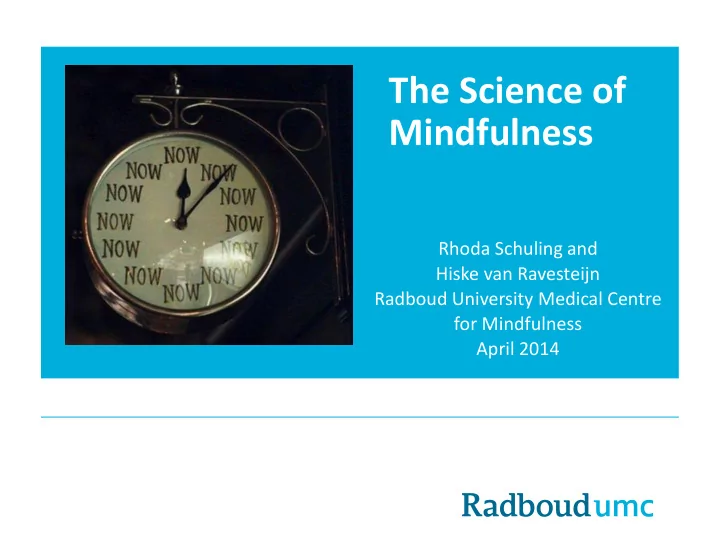

The Science of Mindfulness Rhoda Schuling and Hiske van Ravesteijn Radboud University Medical Centre for Mindfulness April 2014
Research 2013: 434 publications Source: www.pubmed.nl
Mindfulness: what is it? Paying attention to the present moment, with a curious, investigative, kind awareness
Mindfulness: what is it? Paying attention to the present moment, with a curious, investigative, kind awareness
Mindfulness: what is it? Paying attention to the present moment , with a curious, investigative, kind awareness
Mindfulness: what is it? Paying attention to the present moment, with a curious, investigative, kind awareness
Mindfulness: what is it? Pay ing attention to the present moment, with a curious, investigative, kind awareness
Mindfulness - Origins Somewhere in the seventies … : Jon Kabat-Zinn: Mindfulness Based Stress Reduction Somewhere in the late nineties … : Segal, Williams & Teasdale: Mindfulness Based Cognitive Therapy Somewhere 500 B.C. ... : Buddha: Buddhism
How it’s set up FORMAT CONTENT Group training: 8-12 participants Meditation practice 8 weeks, 2.5 hrs per week Inquiry/group exchange Homework: 1 hr per day Psycho-education
You won’t know about playing the piano by only listening to someone talk about it … Let’s practice!
Working mechanisms
Anterior Cingulate Cortex > Attention regulation Emotion regulation & self-perspective Insula > Body awareness
Mindfulness en psychische gezondheid
Mindfulness for patients with recurrent depressions
Reduction of relapse rate in depression Teasdale et al., 2000
MBCT bij depressieve klachten Van Aalderen, 2012
Mindfulness for patients with medically unexplained symptoms
Mindfulness training
Mental functioning P < 0.05 P < 0.05
How does it work?
Participant observation reports Written patient Interviews with notes patients Data resources
Self- Being in the compassion present Process of Changing Awareness change patterns Insight in Acceptance patterns
Being in Self- the compassion present Process of Changing Awareness change patterns Insight in Acceptance patterns
Self- Being in the compassion present Process of Changing Awareness change patterns Insight in Acceptance patterns
Self- Being in the compassion present Process of Changing Awareness change patterns Insight in Acceptance patterns
Self- Being in the compassion present Process of Changing Awareness change patterns Insight in Acceptance patterns
Self- Being in the compassion present Process of Changing Awareness change patterns Insight in Acceptance patterns
Self- Being in the compassion present Process of Changing Awareness change patterns Insight in Acceptance patterns
Self- Being in compassion the present Process of Changing Awareness change patterns Insight in Acceptance patterns
I really felt that I am allowed to be there: everything is okay, whatever I feel. - Andrea, 50 y -
Self- Being in the compassion present Process of Changing Awareness change patterns Insight in Acceptance patterns
Self- Being in the compassion present Process of Changing Awareness change patterns Insight in Acceptance patterns
Self- Being in the Social compassion present problems Process of Changing Awareness change patterns Insight in Acceptance patterns
Self- Being in the compassion present Process of Changing Awareness change patterns Insight in Acceptance Non- patterns acceptance
Self- Being in the compassion present Process of Changing Awareness change patterns Insight in Acceptance patterns
Mindfulness training Focus on short term relief Acceptance of discomfort as a part of life Focus on self care
Compassion Research Why compassion?
Quantitative data Pilot Study Compassion 16 14 Score Depressive 12 symptoms Questionnaire 10 Voor 8 p= 0,060 Na 6 4 2 0 Depression**
26 Score Self- Compassion 25 Questionnaire 24 p = 0,015 23 Voor 22 Na 21 20 19 Self-Compassion*
Randomised, controlled trial MBCL+TAU 6 months =52 N=102 Randomisation TAU=50 MBCL+TAU 6 months BASE ET/EC FU/ETC FUC
You won’t know about compassion by only listening to someone talk about it … Let’s practice!
Questions, comments …?
Recommend
More recommend